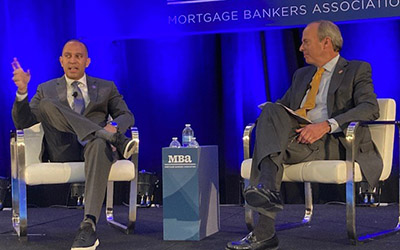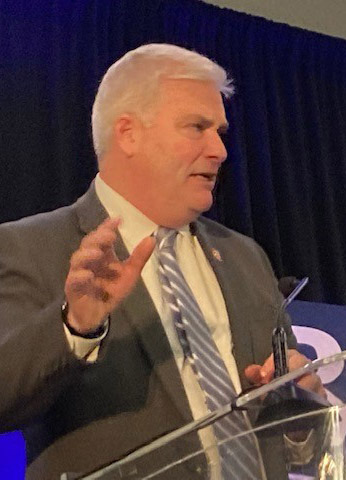
House Leaders: Bipartisanship Yes…But…

Rep. Hakeem Jeffries, D-N.Y., talks with MBA President & CEO Bob Broeksmit, CMB, Tuesday at the MBA National Advocacy Conference in Washington, D.C.
WASHINGTON—The partisan gridlock that has marked Congress for much of the past decade was on full display Tuesday at the MBA National Advocacy Conference—albeit with somewhat more diplomacy than previously observed.
Rep. Tom Emmer, R-Minn., who serves as Chairman of the National Republican Campaign Committee; and Rep. Hakeem Jeffries, D-N.Y., Chairman of the House Democratic Caucus, addressed attendees about the need for bipartisanship to solve the country’s economic and social issues. But how to get there, they conceded, presents its own challenges.

“We—Republicans and Democrats—saw the warning signs of inflation a couple of years ago,” Emmer said. “If you just print money—like the Federal Reserve is doing—and inject it in the economy, you’re going to have incredible demand. And today, we have double-digit inflation—the most in 40 years. Home prices are going up at a ridiculous rate.”
To fix this, Emmer said, “we have to change things immediately. The Fed is trying to make money more expensive—something they should have done earlier. But this Administration has to change course immediately—and it has to be embraced by both Democrats and Republicans.”
But, Emmer added, from his perspective, “The Democrats aren’t listening.” But he conceded that Republicans have to get on board as well. “We have to get on the same page,” he said. “We need a law that looks to responsible budgeting and put the country on much better footing. This Administration is not doing that; but frankly, the previous Administration didn’t do it, either.”
Jeffries’ remarks also focused on bipartisanship, noting several 2020 and 2021 economic stimulus packages could not have passed Congress without support across the aisle. “It’s putting us in a stronger position to lead in the 21st century,” he said. “Bipartisan efforts to bring well-paying jobs back to the U.S. is something we can all get behind.”
Affordable housing is a priority of Jeffries. “In Brooklyn, the housing boom has been a good problem to have, but the supply of affordable housing is greatly exceeded by demand,” he said. “This disparity has created problems for seniors trying to live out their golden years, who deserve to have the dignity they deserve; and for working-class families who want to achieve the dream of homeownership. We used to see this problem just in San Francisco and Boston and New York, but now we’re seeing it across the country. At the end of the day, homeownership a large part of the American dream. For a lot of folks back home, that dream is out of reach.
Jeffries said this fall will be pivotal for the country’s future. “When we approached this new Congress under President Biden, we had three goals: crush the virus; assist those who were struggling; and build the economy,” he said. “We cannot lose sight of the fact that we have made progress. We now have 225 Americans vaccinated…we’ve created eight million good-paying jobs—the fastest rate in more than 40 years; wages have increased; and the deficit was reduced by more than a trillion in each of the first two years of the Biden Administration.
Jeffries said the challenge for Democrats this fall is to tout these successes with sensitivity, “because a lot of Americans are still struggling. But we have to tell this story.”
Emmer emphasized that legislative and regulatory reforms must be addressed carefully, to avoid doing more harm. “Most American businesses started in a garage,” he said. “The financial system in this country is what separates this country from every other country on the planet; it literally defines our freedom. Where else can a dumb schlub like me [Emmer is in the lumber business] go into a bank and propose an idea and get financing for it?”
